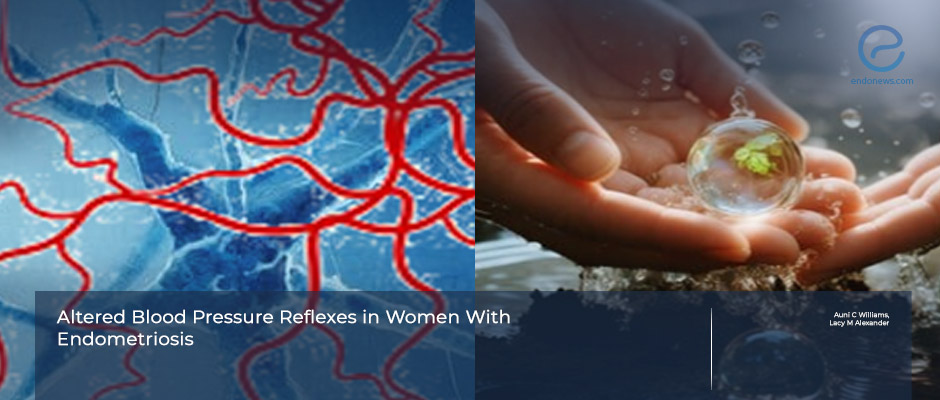Endometriosis and Impaired Neurovascular Control
Sep 19, 2025
Endometriosis Patients Show Altered Cardiovascular Responses to Cold and Exercise
Key Points
Highlights:
- Women with endometriosis show weakened autonomic blood pressure reflexes under physical and cold stress, revealing a systemic dimension of the disease beyond the pelvis.
Importance:
- Findings point to autonomic nervous system dysregulation, a mechanism that may contribute to systemic symptoms beyond pelvic pain.
- Understanding autonomic dysfunction in endometriosis could explain associated symptoms like fatigue, orthostatic intolerance, and altered stress responses, while also raising concerns about long-term cardiovascular risk.
What’s done here:
- This is a case-control physiological study from the Department of Kinesiology of The Pennsylvania State University.
- 28 premenopausal women with laparoscopically confirmed endometriosis and 28 age-matched healthy controls were recruited.
- Standardized stress tests; namely Cold pressor test (hand immersion in ice water) and Isometric handgrip exercise were performed.
- Blood pressure and heart rate responses were continuously monitored to evaluate pressor reflexes and autonomic cardiovascular regulation.
- Statistical models were used to compare the groups while adjusting for confounders such as medication use and menstrual cycle phase.
Key results:
- Women with endometriosis exhibited diminished blood pressure responses to both cold exposure and isometric exercise compared with controls.
- Heart rate remained unchanged, indicating that the impairment lies primarily in vascular reflex regulation rather than cardiac control.
- These findings support the presence of altered sympathetic vasomotor function in endometriosis.
Strength and Limitations:
- Strengths are being an innovative study, using standardized autonomic testing protocols, exploring an overlooked physiological domain in endometriosis, and providing a reproducible mechanistic link between the disease and systemic symptoms beyond the pelvis.
- Limitations are the relatively small sample size that restricts generalizability, the cross-sectional design that prevents causal inference, and the lack of molecular biomarkers to substantiate the physiological findings.
From the Editor-in-Chief – EndoNews
"This elegant physiological study challenges the traditional view of endometriosis as a disorder confined to pelvic lesions. By demonstrating impaired autonomic reflexes, it reveals that endometriosis may exert multisystem effects through neurovascular dysregulation. This perspective helps explain why patients so often report systemic symptoms—fatigue, dizziness, circulatory instability—that cannot be accounted for solely by visible lesions or pain severity.
The novelty of this work lies in its use of standardized autonomic testing protocols, allowing reproducible assessment of cardiovascular reflexes. In doing so, it opens a neglected frontier in endometriosis research: the interface between gynecology, neurology, and cardiology. Such integrative physiology reframes endometriosis from a localized gynecologic condition into a systemic disease with widespread consequences.
Although exploratory and limited by sample size, the study underscores the urgent need for larger, multidisciplinary investigations that incorporate autonomic, cardiovascular, and molecular biomarkers. If validated, these findings could pave the way for entirely new management strategies—from autonomic rehabilitation therapies to proactive cardiovascular risk monitoring—for a patient population that remains underserved in systemic health research.
By linking pelvic disease with systemic physiology, this research not only advances mechanistic understanding but also pushes the field toward holistic, patient-centered care."
Lay Summary
Endometriosis is usually considered a pelvic disease, but its impact may extend well beyond the reproductive system. Many women with the condition report fatigue, dizziness, or circulatory instability that cannot be explained solely by lesions or pain. One possible explanation is dysfunction of the autonomic nervous system, which controls blood pressure and heart rate reflexes.
Auni C. Williams and colleagues at Pennsylvania State University, USA, explored this hypothesis in the first study of its kind, published in journal named Hypertension of American Heart Association.
They recruited 28 women with surgically confirmed endometriosis and 28 healthy controls, matched for age and body mass index, and subjected both groups to standardized autonomic testing. These included the cold pressor test, in which a hand is immersed in ice water to trigger a stress response, and the isometric handgrip test, where sustained muscular contraction elevates blood pressure.
The results were striking: women with endometriosis had blunted blood pressure increases in both tests, indicating impaired sympathetic vasomotor reflexes. Heart rate responses, however, were not significantly different, suggesting that the dysfunction was vascular rather than cardiac.
This study demonstrates for the first time that endometriosis may be linked to measurable autonomic dysfunction, and the findings provide the evidence that women with endometriosis may have measurable autonomic dysfunction, which could help explain systemic symptoms that extend beyond the reproductive system. The authors emphasize that endometriosis should be viewed not just as a pelvic disease, but as a condition with potential multisystem effects.
Registered at ClinicalTrials.gov (NCT05962034), the study highlights the importance of integrated cardiovascular and autonomic assessment in endometriosis care and calls for larger longitudinal studies to confirm whether autonomic dysfunction is a cause or consequence of the disease.

